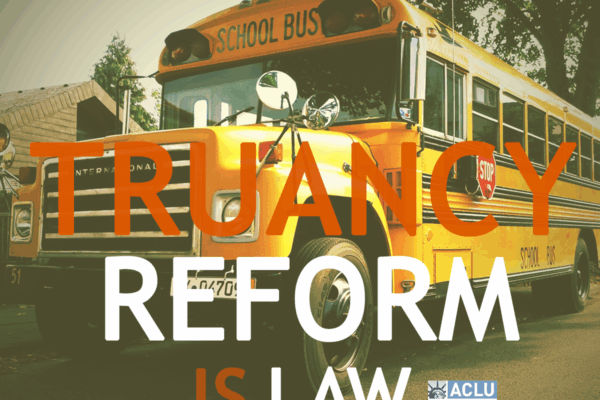West Virginia takes meaningful first steps in reforming our state’s broken juvenile justice system as House Bill 2550 takes effect today. Yet to create lasting change we must fund community-based alternatives to incarceration in the Mountain State. As a result of passage of truancy reform and the Governor's Juvenile Justice bill, the predicted $20 million dollars in savings that the state will realize by locking up fewer youth for low-level or first time offenses should be reinvested into programs that have a proven record of reducing child poverty and keeping kids out of the criminal justice system.
Last legislative session, the ACLU of WV led the effort to address our state’s draconian truancy law in which a student missing just five unexcused days from school may be referred to court. The harsh five-day threshold was one of the lowest in the country. Under the old standard, one in three West Virginia children is truant. Truancy accounted for forty percent of all referrals to the court system and helped make West Virginia only one of two states to experience an increase in youth confinement since the year 2000.
The new law calls for schools to send a letter home to parents after three unexcused absences; meet with the family after five and possibly adjust down the number of unexcused days; and engage the court after ten. In addition, the law provides much needed clarification on what types of absences are counted as unexcused.
While we celebrate today’s milestone, without meaningful alternatives to incarceration, judges may continue to lock up youth who have no business being in the court system. Notably, the Department of Justice recently issued a report on West Virginia’s youth mental health system and found that too many youth in need of mental health services are being sent to out of home facilities because of a lack of services in local communities, in violation of the Americans with Disabilities Act and Title VI of the Civil Rights Act of 1964. Many of these same children are eventually shuffled through the juvenile justice system.
Other states, from Ohio to New York, have reformed their juvenile justice systems by investing in programs that match youth with mentors, provide needed counseling services for families and youth, and place children with mental health and/or drug treatment programs. These services cost less than incarceration and are more effective long-term at reducing recidivism rates. West Virginia should follow in their footsteps and make the commitment to change our punitive system into a system that provides youth with the tools they need to succeed instead of setting them up for failure. The ACLU of West Virginia will push next session for reinvestment of the savings from the juvenile justice reform legislation into community-based alternatives. Our state’s children deserve no less.

